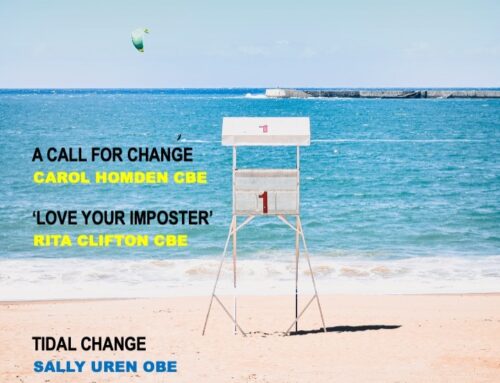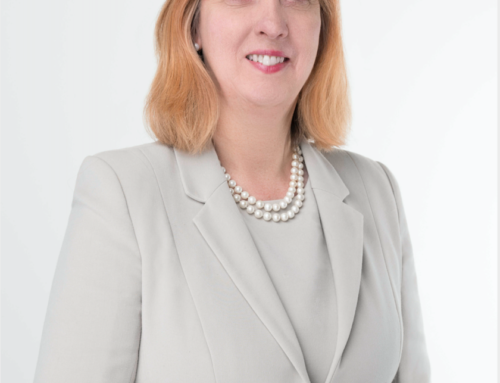Deborah Alsina MBE
An Independent Age
Our daily lives have been completely transformed in a very short space of time. It’s incredible to think that just a few short weeks ago, Independent Age’s caring volunteers were still visiting the older people they support, and my colleagues and I were travelling to the office each day.
Coronavirus is having a huge impact on the lives of older people worldwide, and particularly those deemed at risk who have been advised to stay indoors for an extended period of time. I’m one of them as I live with my 88-year-old mother and husband, who has leukaemia, so the whole family is self-isolating to keep them safe.
Independent Age has had to adapt its whole approach. We’ve suspended face-to-face volunteering to keep everyone safe, and now provide regular welfare checks over the phone to make sure people are feeling ok, have the essentials like food and medication and a support network of friends and family around them. We are asked for advice on everything from finding a new care home for a relative at this time to whether or not people should go to the supermarket themselves.
Medical treatment is of course high on the agenda. Last week, I signed a joint statement with other older people’s charities and organisations, which called for priority treatment for Covid-19 to not simply be made on chronological age – which we know is a poor proxy for health. We need to make rights-based decisions that we can feel proud of after this crisis is over.
The way society treats and talks about older people has also come under the spotlight. In late March, Independent Age surveyed people over 65 across the UK to better understand the pressure points that older people are dealing with right now. We found that nearly 1 in 8 people had either heard, or been on the receiving end of, ageist language in relation to Coronavirus. That’s appalling and there’s never any place for it – because if we’re lucky, we will all be older one day.
Having highlighted the impacts, here are some practical things we can all do to support older people through the Coronavirus outbreak.
Making sure people have enough food
People might need help with ordering groceries, or medication, particularly if they’re not online. Even for those who are, it’s well-documented that getting online delivery slots has been very difficult. In fact, our recent survey also found that nearly two-thirds (64%) haven’t been able to buy enough food to meet their day-to-day needs during the outbreak.
At Independent Age we have some great tips on how to help people in your community, and while we are not actively recruiting community volunteers to support older people with things like obtaining food and prescriptions, we are instead referring people to register as NHS Responders.
Brilliant initiatives have sprung up all over the country in the form of Covid-19 mutual aid groups – check to see if there’s one in your area. If you live too far away from family to help them out directly, check if there’s one close to them.
If you are running errands for people, stay outside of their homes, and let family and friends know what you’re doing. If you’re trying to help someone with very serious issues, don’t be afraid to flag this with the appropriate statutory services.
Keeping in touch
Many of us are now working at home all day every day and not seeing anyone, and this time has probably been a window onto the world of the 1.2 million older people who say they always or often feel lonely. That’s of huge concern to us at Independent Age. Connecting with people is one of the great joys of life, so now that is curtailed for potentially a number of months, it’s difficult. We should all make more of an effort to keep in touch. Where you can, make sure a friend or relative can video call – teach them over the phone how to do this, so they can still see a friendly face. It will be a huge help.
What if a loved one becomes ill?
It’s so hard to talk about illness and potentially dying, but now is a very good time to talk to older family and friends about their wishes, should they become ill and a decision about treatment needs to be made on their behalf. Start the conversation yourself by telling someone you trust about what’s important to you and how you would like to be cared for. More importantly, make sure everyone writes their wishes down and lets someone they trust know where to find a copy.
Stay fit and well
I can’t stress enough how important it is for people of all ages to stay healthy – but also how difficult it can be for those who have been told to stay home for an extended period of time, like my family and I are doing. Luckily for us all, the NHS has published information about strength exercises you can do at home. Even opening a window and getting some fresh air and sunlight can help.
Avoiding scams
Sadly, even during a global health emergency there are cruel opportunists who want to take advantage of others. If you’re worried that someone has been targeted by a scam, reassure them that it’s not their fault, and report any scams to the police or to Action Fraud.
There’s no doubt that this pandemic will continue to affect all of us for some time to come, whatever our age. Each one of us must do all we can to help each other through it.
About Independent Age
 Independent Age is a national older people’s charity that wants to make the UK a place where can all live happy, connected, and purposeful later lives. During the coronavirus crisis, we have prioritised our efforts to ensure we continue to provide support to the 3000+ older people with whom we currently work.
Independent Age is a national older people’s charity that wants to make the UK a place where can all live happy, connected, and purposeful later lives. During the coronavirus crisis, we have prioritised our efforts to ensure we continue to provide support to the 3000+ older people with whom we currently work.
For more information, visit our website www.independentage.org
Arrange to speak to one of our advisers for free and confidential advice and information. Call our Freephone number on 0800 319 6789 or email [email protected]
Deborah Alsina MBE
Chief Executive, Independent Age
@DeborahAlsina
@IndependentAge
@IndependentAge
https://www.independentage.org/

Deborah Alsina MBE
An Independent Age
Our daily lives have been completely transformed in a very short space of time. It’s incredible to think that just a few short weeks ago, Independent Age’s caring volunteers were still visiting the older people they support, and my colleagues and I were travelling to the office each day.
Coronavirus is having a huge impact on the lives of older people worldwide, and particularly those deemed at risk who have been advised to stay indoors for an extended period of time. I’m one of them as I live with my 88-year-old mother and husband, who has leukaemia, so the whole family is self-isolating to keep them safe.
Independent Age has had to adapt its whole approach. We’ve suspended face-to-face volunteering to keep everyone safe, and now provide regular welfare checks over the phone to make sure people are feeling ok, have the essentials like food and medication and a support network of friends and family around them. We are asked for advice on everything from finding a new care home for a relative at this time to whether or not people should go to the supermarket themselves.
Medical treatment is of course high on the agenda. Last week, I signed a joint statement with other older people’s charities and organisations, which called for priority treatment for Covid-19 to not simply be made on chronological age – which we know is a poor proxy for health. We need to make rights-based decisions that we can feel proud of after this crisis is over.
The way society treats and talks about older people has also come under the spotlight. In late March, Independent Age surveyed people over 65 across the UK to better understand the pressure points that older people are dealing with right now. We found that nearly 1 in 8 people had either heard, or been on the receiving end of, ageist language in relation to Coronavirus. That’s appalling and there’s never any place for it – because if we’re lucky, we will all be older one day.
Having highlighted the impacts, here are some practical things we can all do to support older people through the Coronavirus outbreak.
Making sure people have enough food
People might need help with ordering groceries, or medication, particularly if they’re not online. Even for those who are, it’s well-documented that getting online delivery slots has been very difficult. In fact, our recent survey also found that nearly two-thirds (64%) haven’t been able to buy enough food to meet their day-to-day needs during the outbreak.
At Independent Age we have some great tips on how to help people in your community, and while we are not actively recruiting community volunteers to support older people with things like obtaining food and prescriptions, we are instead referring people to register as NHS Responders.
Brilliant initiatives have sprung up all over the country in the form of Covid-19 mutual aid groups – check to see if there’s one in your area. If you live too far away from family to help them out directly, check if there’s one close to them.
If you are running errands for people, stay outside of their homes, and let family and friends know what you’re doing. If you’re trying to help someone with very serious issues, don’t be afraid to flag this with the appropriate statutory services.
Keeping in touch
Many of us are now working at home all day every day and not seeing anyone, and this time has probably been a window onto the world of the 1.2 million older people who say they always or often feel lonely. That’s of huge concern to us at Independent Age. Connecting with people is one of the great joys of life, so now that is curtailed for potentially a number of months, it’s difficult. We should all make more of an effort to keep in touch. Where you can, make sure a friend or relative can video call – teach them over the phone how to do this, so they can still see a friendly face. It will be a huge help.
What if a loved one becomes ill?
It’s so hard to talk about illness and potentially dying, but now is a very good time to talk to older family and friends about their wishes, should they become ill and a decision about treatment needs to be made on their behalf. Start the conversation yourself by telling someone you trust about what’s important to you and how you would like to be cared for. More importantly, make sure everyone writes their wishes down and lets someone they trust know where to find a copy.
Stay fit and well
I can’t stress enough how important it is for people of all ages to stay healthy – but also how difficult it can be for those who have been told to stay home for an extended period of time, like my family and I are doing. Luckily for us all, the NHS has published information about strength exercises you can do at home. Even opening a window and getting some fresh air and sunlight can help.
Avoiding scams
Sadly, even during a global health emergency there are cruel opportunists who want to take advantage of others. If you’re worried that someone has been targeted by a scam, reassure them that it’s not their fault, and report any scams to the police or to Action Fraud.
There’s no doubt that this pandemic will continue to affect all of us for some time to come, whatever our age. Each one of us must do all we can to help each other through it.
About Independent Age
Independent Age is a national older people’s charity that wants to make the UK a place where can all live happy, connected, and purposeful later lives. During the coronavirus crisis, we have prioritised our efforts to ensure we continue to provide support to the 3000+ older people with whom we currently work.
For more information, visit our website www.independentage.org
Arrange to speak to one of our advisers for free and confidential advice and information. Call our Freephone number on 0800 319 6789 or email [email protected]
Deborah Alsina MBE
Chief Executive, Independent Age
@DeborahAlsina
T: @IndependentAge
IG: @IndependentAge
https://www.independentage.org/




